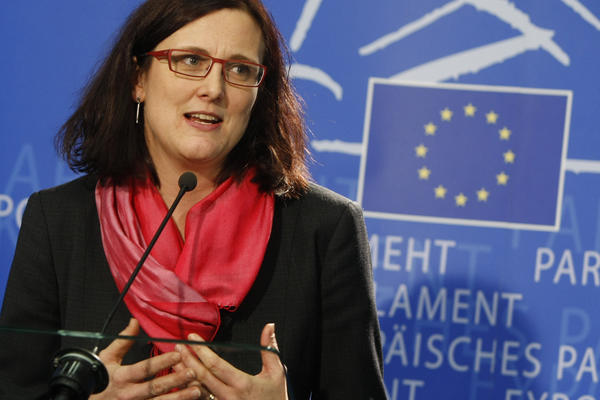Britain-China trade and investment
Contents |
[edit] Introduction
On 25 February 2016, Designing Buildings Wiki attended the China Association Lunch to listen to a talk by EU Trade Commissioner Cecilia Malmström on the topic ‘The EU and China: Trade and investment in the global economy’.
The event was hosted by the China-Britain Business Council, a board made up of senior business people, from companies across a wide range of sectors with a strong China interest.
To begin, Malmström emphasised that Chinese investment in the EU is four times what it was in 2008, and that Chinese growth in recent years has brought the country back to a more modern form of politics and has lifted millions out of poverty. However, she didn’t shy away from acknowledging that China’s human rights issues have begun to affect the business sector, with doubts hitting EU investment.
[edit] Steel
The biggest challenge is steel, with the current over-capacity being unsustainable. Malmström agreed that this is a major issue for many EU partners, and that she wrote to the Chinese Minister of Commerce to express concern and address the issue of over-production and the knock-on impacts this was having to steel producers, including in the UK. There are also internal discussions taking place with the European Commission and steel will be high on the agenda for the European Council meeting in March.
Despite ongoing dialogue with the Chinese and her assertion that there were ‘positive oral signals’, she stressed that the EU were monitoring the situation closely and were hoping to see positive action. Trade defence instruments on imports of steel are being used and 37 investigations are proceeding, although she was cautious to make clear there are no quick fixes and the investigations would need time to process all the evidence.
[edit] Market economy status
China’s dumping of cheap steel on the market highlights the concerns over their potential in the near future to attain Market Economy Status from the World Trade Organisation. These concerns are based on the EU potentially having a more difficult time imposing anti-dumping duties on Chinese goods. This is something that continues to be hindered due to the dominance of Chinese state-owned enterprises, despite China’s assertion that they will automatically be made a market economy by the end of 2016.
According to Malmström, free trade agreements have been proposed by China for many years, but the EU continues to hold firm on two main criteria: China’s commitment to the same agreements as other states, and their commitment to internal reforms. But she asked whether the EU was obliged to China on this issue anyway?
The EU is the only entity in the world that has laws on Market Economy Status, as opposed to other countries such as America and Australia. There is a need for detailed impact assessments to be carried out on a sector-by-sector and country-by-country basis.
So whilst difficulties are ongoing, there are also possibilities. She expressed hope that a single modern trade agreement with China might replace the 26 bilateral agreements that currently exist, thereby allowing greater investment opportunities.
[edit] EU referendum
An audience member raised the point that since the Chinese view trade as ‘trade lines’ not ‘trade blocks’ would ‘Brexit’ make any real difference? Malmström said that negotiating as 28 nations, the largest economy in the world, carries more weight than negotiating trade agreements alone and stated her belief that most Chinese investors would prefer to invest in a Britain within the EU than outside.
Find out more about the China-Britain Business Council here.
Featured articles and news
Restoration and renewal of the Palace of Westminster
A complex project of cultural significance from full decant to EMI, opportunities and a potential a way forward.
Apprenticeships and the responsibility we share
Perspectives from the CIOB President as National Apprentice Week comes to a close.
The first line of defence against rain, wind and snow.
Building Safety recap January, 2026
What we missed at the end of last year, and at the start of this...
National Apprenticeship Week 2026, 9-15 Feb
Shining a light on the positive impacts for businesses, their apprentices and the wider economy alike.
Applications and benefits of acoustic flooring
From commercial to retail.
From solid to sprung and ribbed to raised.
Strengthening industry collaboration in Hong Kong
Hong Kong Institute of Construction and The Chartered Institute of Building sign Memorandum of Understanding.
A detailed description from the experts at Cornish Lime.
IHBC planning for growth with corporate plan development
Grow with the Institute by volunteering and CP25 consultation.
Connecting ambition and action for designers and specifiers.
Electrical skills gap deepens as apprenticeship starts fall despite surging demand says ECA.
Built environment bodies deepen joint action on EDI
B.E.Inclusive initiative agree next phase of joint equity, diversity and inclusion (EDI) action plan.
Recognising culture as key to sustainable economic growth
Creative UK Provocation paper: Culture as Growth Infrastructure.
Futurebuild and UK Construction Week London Unite
Creating the UK’s Built Environment Super Event and over 25 other key partnerships.
Welsh and Scottish 2026 elections
Manifestos for the built environment for upcoming same May day elections.
Advancing BIM education with a competency framework
“We don’t need people who can just draw in 3D. We need people who can think in data.”























